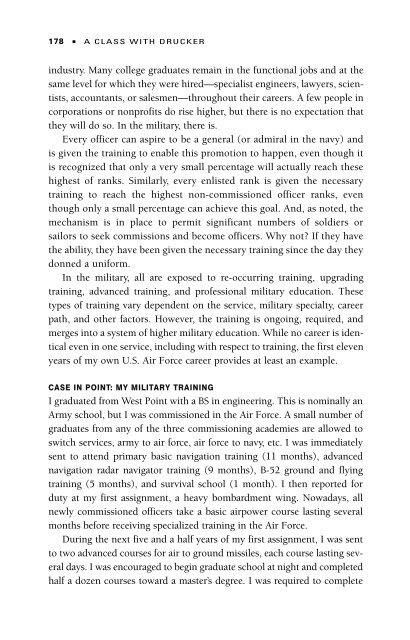A Class with Drucker - Headway | Work on yourself
A Class with Drucker - Headway | Work on yourself
A Class with Drucker - Headway | Work on yourself
Create successful ePaper yourself
Turn your PDF publications into a flip-book with our unique Google optimized e-Paper software.
178 ■ A CLASS WITH DRUCKER<br />
industry. Many college graduates remain in the functi<strong>on</strong>al jobs and at the<br />
same level for which they were hired—specialist engineers, lawyers, scientists,<br />
accountants, or salesmen—throughout their careers. A few people in<br />
corporati<strong>on</strong>s or n<strong>on</strong>profits do rise higher, but there is no expectati<strong>on</strong> that<br />
they will do so. In the military, there is.<br />
Every officer can aspire to be a general (or admiral in the navy) and<br />
is given the training to enable this promoti<strong>on</strong> to happen, even though it<br />
is recognized that <strong>on</strong>ly a very small percentage will actually reach these<br />
highest of ranks. Similarly, every enlisted rank is given the necessary<br />
training to reach the highest n<strong>on</strong>-commissi<strong>on</strong>ed officer ranks, even<br />
though <strong>on</strong>ly a small percentage can achieve this goal. And, as noted, the<br />
mechanism is in place to permit significant numbers of soldiers or<br />
sailors to seek commissi<strong>on</strong>s and become officers. Why not? If they have<br />
the ability, they have been given the necessary training since the day they<br />
d<strong>on</strong>ned a uniform.<br />
In the military, all are exposed to re-occurring training, upgrading<br />
training, advanced training, and professi<strong>on</strong>al military educati<strong>on</strong>. These<br />
types of training vary dependent <strong>on</strong> the service, military specialty, career<br />
path, and other factors. However, the training is <strong>on</strong>going, required, and<br />
merges into a system of higher military educati<strong>on</strong>. While no career is identical<br />
even in <strong>on</strong>e service, including <str<strong>on</strong>g>with</str<strong>on</strong>g> respect to training, the first eleven<br />
years of my own U.S. Air Force career provides at least an example.<br />
CASE IN POINT: MY MILITARY TRAINING<br />
I graduated from West Point <str<strong>on</strong>g>with</str<strong>on</strong>g> a BS in engineering. This is nominally an<br />
Army school, but I was commissi<strong>on</strong>ed in the Air Force. A small number of<br />
graduates from any of the three commissi<strong>on</strong>ing academies are allowed to<br />
switch services, army to air force, air force to navy, etc. I was immediately<br />
sent to attend primary basic navigati<strong>on</strong> training (11 m<strong>on</strong>ths), advanced<br />
navigati<strong>on</strong> radar navigator training (9 m<strong>on</strong>ths), B-52 ground and flying<br />
training (5 m<strong>on</strong>ths), and survival school (1 m<strong>on</strong>th). I then reported for<br />
duty at my first assignment, a heavy bombardment wing. Nowadays, all<br />
newly commissi<strong>on</strong>ed officers take a basic airpower course lasting several<br />
m<strong>on</strong>ths before receiving specialized training in the Air Force.<br />
During the next five and a half years of my first assignment, I was sent<br />
to two advanced courses for air to ground missiles, each course lasting several<br />
days. I was encouraged to begin graduate school at night and completed<br />
half a dozen courses toward a master’s degree. I was required to complete


